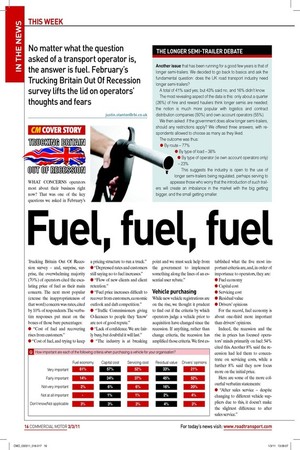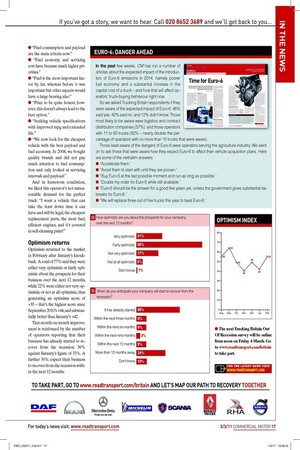Fuel, fuel, fuel
Page 13

Page 14

If you've noticed an error in this article please click here to report it so we can fix it.
Trucking Britain Out Of Recession survey – and, surprise, surprise, the overwhelming majority (70%) of operators cited the escalating price of fuel as their main concern. The next most popular (excuse the inappropriateness of that word) concern was rates, cited by 10% of respondents. The verbatim responses put meat on the bones of those bare percentages: ● “Cost of fuel and recovering rises from customers.” ● “Cost of fuel, and trying to keep a pricing structure to run a truck.” ● “Depressed rates and customers still saying no to fuel increases.” ● “Flow of new clients and client retention.” ● “Fuel price increases dificult to recover from customers, economic outlook and daft competition.” ● “Trafic Commissioners giving O-licences to people they ‘know’ are not of good repute.” ● “Lack of conidence. We are fairly busy, but doubtful it will last.” ● “The industry is at breaking point and we must seek help from the government to implement something along the lines of an essential user rebate.”
Vehicle purchasing
While new vehicle registrations are on the rise, we thought it prudent to ind out if the criteria by which operators judge a vehicle prior to acquisition have changed since the recession. If anything, rather than change criteria, the recession has ampliied those criteria. We irst es tablished what the ive most important criteria are, and, in order of importance to operators, they are: ● Fuel economy ● Capital cost ● Servicing cost ● Residual value ● Drivers’ opinions For the record, fuel economy is about one-third more important than drivers’ opinions.
Indeed, the recession and the rise in prices has focused operators’ minds primarily on fuel: 54% cited this. Another 8% said the recession had led them to concentrate on servicing costs, while a further 8% said they now focus more on the initial price.
Here are some of the more colourful verbatim statements: ● “After sales service – despite changing to different vehicle suppliers due to this, it doesn’t make the slightest difference to after sales service.” ● “Fuel consumption and payload are the main criteria now.” ● “Fuel economy and servicing cost have became much higher priorities.” ● “Fuel is the most important factor by far, whereas before it was important but other aspects would have a large bearing also.” ● “Price to be quite honest, however, this doesn’t always lead to the best option.” ● “Seeking vehicle speciications with improved mpg and extended life.” ● “We now look for the cheapest vehicle with the best payload and fuel economy. In 2008, we bought quality brands and did not pay much attention to fuel consumption and only looked at servicing intervals and payload.” And in humorous conclusion, we liked this operator’s not unreasonable demand for the perfect truck: “I want a vehicle that can take the least down time it can have and still be legal, the cheapest replacement parts, the most fuel, eficient engines, and it’s covered in self-cleaning paint!”
Optimism returns
Optimism returned to the market in February after January’s knockback. A total of 77% said they were either very optimistic or fairly optimistic about the prospects for their business over the next 12 months, while 22% were either not very optimistic or not at all optimistic, thus generating an optimism score of +55 – that’s the highest score since September 2010’s +64, and substantially better than January’s +42.
That month-on-month improvement is reinforced by the number of operators reporting that their business has already started to recover from the recession: 36% against January’s igure of 33%. A further 30% expect their business to recover from the recession within the next 12 months.



















































